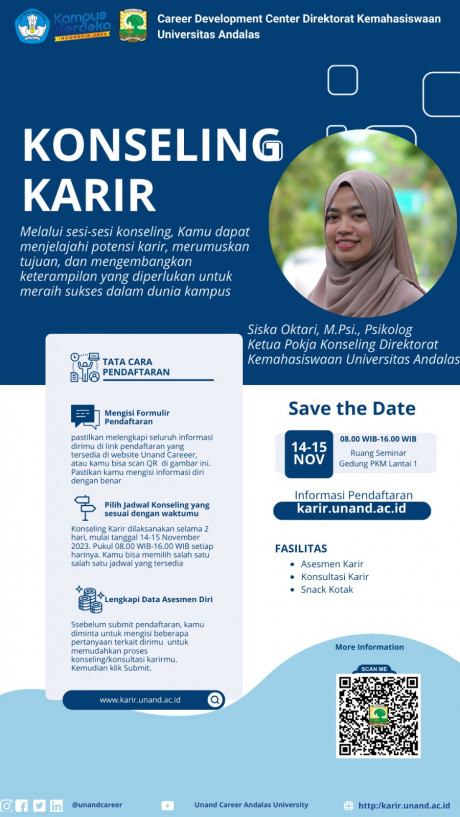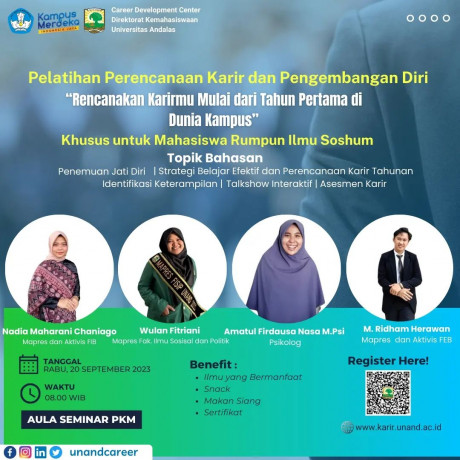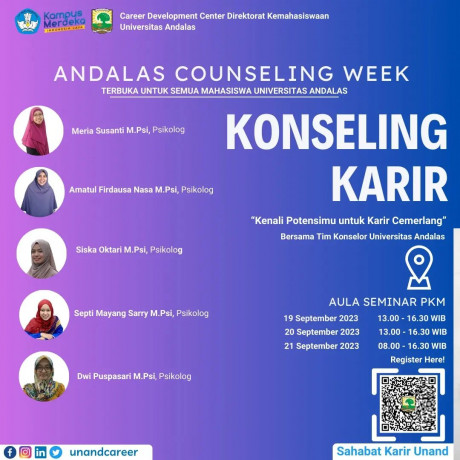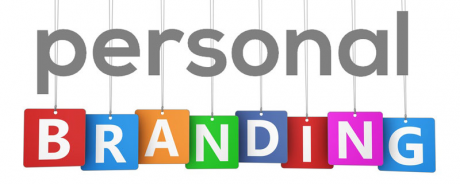Social Media and Mental Health Relation
SKU | 21 Februari 2023 08:22 wib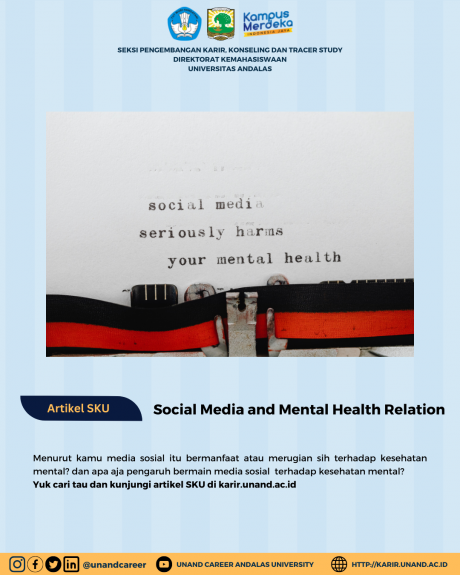 Hi SKU friends! Do you know that social media and mental health have relationship each other? If you don't, let's read the explanation below written by Yevis Haritsyah.
Hi SKU friends! Do you know that social media and mental health have relationship each other? If you don't, let's read the explanation below written by Yevis Haritsyah.
Digital technology have become an
inextricable part of the life of today's youth. Many children are exposed to
screens at a young age, with children under the age of two spending an average
of 42 minutes a day with screen media. The media environment today is broader
and more diversified than it has ever been, with kids having unparalleled
access to digital material across many platforms. The use of social media is an
important part. Social media, in its broadest sense, refers to any digital
tools or apps that enable people to connect socially.Furthermore, given the
features of this developmental time, social media may appeal to teenagers in a
unique way, making them particularly vulnerable to both the benefits and
hazards of new technology.
Mental health is described as a
condition of well-being in which people are aware of their talents, are able to
manage everyday issues, work effectively, and contribute meaningfully to their
communities. There is now a debate going on about the benefits and drawbacks of
social media in terms of mental health. Social networking is an important part
in maintaining our mental wellness. Mental health, health behavior, physical
health, and mortality risk are all influenced by the amount and quality of
social interactions. People who engage in sedentary habits such as social media
use, according to the hypothesis, have less time for face-to-face social
connection, both of which have been shown to be protective against mental
illnesses. Social theories, on the other hand, discovered that social media use
has an impact on mental health by altering how people see, maintain, and engage
with their social network.
Anxiety and sadness were the most
often assessed outcomes in the 16 research. The study found that time spent,
activity, and social media addiction were all significant risk factors for
anxiety and sadness. Anxiety is one of the most common mental health issues in
today's environment. Their submitted images and videos received likes and
comments. In today's world, no one is immune to the virus. In today's world, no
one is immune to the effects of social media. Some teenagers suffer anxiety as
a result of social media, which leads them to attempt to react to and check all
of their friends' messages on a frequent basis. On the contrary, one of the
unexpected consequences of excessive usage of social media is depression. In
particular, depression is restricted not just to Facebook but also to other
social networking sites, resulting in psychological issues. According to a new
study, those who use social media, games, messages, mobile phones, and other
electronic devices are more likely to be depressed.
Individuals with significant mental
illnesses (Spinzy et al. 2012) and young people with mental illness (Gowen et
al. 2012) appear to create online relationships and engage with others on
social media at the same rate as the general population, according to studies.
In a separate research, the majority of young adults with significant mental
illness said they utilized social media to feel less alone (Gowen et al. 2012).
More frequent use of social media was related with more community involvement
in a sample of people with significant mental illness, as defined by shopping,
work, religious activities, or visiting friends or higher civic involvement, as
evidenced by voting in local elections or visiting friends and relatives, as
well as increased civic engagement, as evidenced by voting in local elections
(Brusilovskiy et al. 2016).
Various research have looked into
the topic of online peer assistance for those with mental illnesses. There
appeared to be chances to feel less alone, give hope, find support and learn
through reciprocal reciprocity, and share coping techniques for day-to-day
challenges in a content analysis of comments submitted to YouTube by persons
who self-identified as having a significant mental illness. Bauer et al. (2013)
showed the primary motivation for patients with bipolar illness to participate
in online self-help forums was to share emotions with others, exchange
knowledge, and profit from being a member of an online social group.
Many people with mental illnesses
have found that social media has become an essential part of their life. Many
of these people use social media to discuss their own experiences with mental
illness, seek support from others, and find information on treatment options,
mental health services, and coping with symptoms. As the area of digital mental
health develops, social media platforms' broad reach, simplicity of use, and
popularity might be utilized to help people who need mental health services or
are dealing with mental illness find evidence-based therapy and support. To
achieve this goal, and to see if social media platforms can help close the gap
in available mental health, researchers will need to collaborate closely with
clinicians and those who are affected by mental illness to ensure that
potential benefits of using social media are carefully weighed against
potential risks.
References:
A. Naslund, J., Bondre, A., Torous, J., & A.
Aschbrenner, K. (2020, April). Social Media and Mental Health: Benefits, Risks,
and Opportunities for Research and Practice. Journal of Technology in
Behavioral Science, 245–257. https://doi.org/10.1007/s41347-020-00134-x
Karim, F., Oyewande, A., F. Abdalla, L., Chaudy Ehsanullah,
R., & Khan, S. (2020, June). Social Media Use and Its Connection to Mental
Health: A Systematic Review. Cureus. Published.
https://doi.org/10.7759/cureus.8627
Written by Yevis Haritsyah
Konselor Sebaya Akt. II Unand

